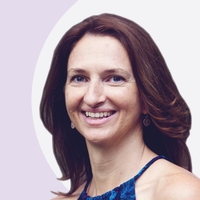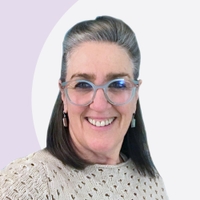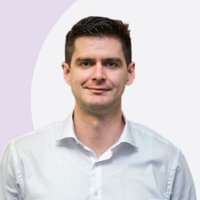
.jpg)
5 minutes with Daniel Baden
Naturopath, Podcaster, Experienced Speaker
How did you come into the healthcare space? We'd love to hear that background and your story.
Thank you. For me, I grew up in a family that had never talked about natural medicine. I knew nothing about natural medicine. It was a very conservative type of family. I travelled overseas and in an African country I got a rare parasite called bilharzia. This is many years ago when I was about 20 and I went back to London and went to a gastroenterologist who diagnosed it, but couldn't really help me much at that time or what he offered didn't help. I had a friend that was into homoeopathy and took me to a homoeopath. I found that really solved the situation almost straight away, then I didn't really give it much more thought. I came back to Australia after a couple of years backpacking as young Aussies do and I'd always thought that I'd like to be a chiropractor because I played a lot of AFL football as a youngster.
I had a family friend that was a chiropractor and I thought I'd love to be in that sport sort of chiropractic environment. I applied to the chiropractic college, but I'd missed the intake that year and stumbled across a course called naturopathy, which I'd never really heard of. I read a bit about it and I thought, wow, that sounds really interesting. 35 years later I feel that chiropractic to me would've been nowhere near as interesting as naturopathy. It's funny how the universe opens up and leads you in a certain way Jacqui.
Any pointers for practitioners that can get overwhelmed by research and the biochemistry and trying to juggle anecdotal evidence?
Absolutely. It's really interesting because I find myself associating with practitioners that have been very well established, around for a very long time, and practitioners that are fairly new to the profession. So it's really interesting to listen to the juxtapositions. I suppose it happens in every profession, but we are also certainly victims of that. The practitioners that are well established tend to really rely a lot more, I feel, on intuition and trust and what feels right. And I think that's really important to develop that sense of trusting yourself to go with and in the direction of what you think is the right thing to do for that patient at that time. There are many influences on naturopathy these days and naturopaths and biochemistry is wonderful and so important to help us understand the human body better. But it really is only part of the story. To be honest, it’s arrogant for us to think that everything comes from understanding a specific biochemical pathway. I see many people trying to lean their practice on understanding one specific little biochemical pathway and forgetting to step back sometimes and always regard the whole person. So it's so important just to keep looking at the whole person and really understand that biochemistry and even research, which is also critically important, but it once again only gives us one part of the story. The problem for all of us is that research gets a little bit twisted, both in medicine but also in natural medicine. And you can look at it; one example might be something like coenzyme Q10 which exists in a couple of different forms, ubiquinone and ubiquinol. They're both valid, however one is much more expensive than the other. But if you read selective research, you'd think that one was so much better than the other one. Whereas when you read the weight of studies and research, it's not that way. We need both the oxidised and the non-oxidised forms and it relates to different diseases and it relates to different ages as to when you need one more than the other. They're both really good.
We need to just step back and just think of what we are doing and what we're giving people in relation to that person and their needs at that time in their life. I just think that's really important. We see lots of white papers being represented as published studies and white papers are interesting, however, a white paper is not a research study, but they get presented that way often and often in complementary medicine or natural medicine, as I prefer to call it, because a white paper is really just the marketing department of a company. It's made it look really spiffy, but it's not a published study. So we just need to step back and just understand how everything works and really just look at the whole person and trust yourself and trust your intuition.
Trusting your intuition is important. How do you balance trusting your intuition vs medical model of investigation?
I have found myself in an interesting position throughout my career, especially in the last 10 or 15 years where I see a lot of younger naturopaths sort of want to practice more in a medical way. And I see a lot of experienced doctors wanting to understand and practice more the philosophies of natural medicine. So I had given a number of talks to groups of doctors that really just wanted to understand food combining and put it into practice and understand why balancing certain dietary aspects was just so important and the philosophy of how we heal. So we see something important in each one of our techniques, but at the end of the day, I do feel that doctors leave their education with a lot more confidence than naturopaths leave their education with. And I really think that confidence is a really big part of going into practice, which we need to build on a little bit.
What do you think nurtures independent critical thinking for practitioners and students?
I think it's really about not believing everything you hear and just trust yourself. I've been to some seminars and webinars over the years presented by various companies who are introducing a new product and you are kind of halfway through and you think Gee, if I don't take this product, I'm going to die tomorrow. So it just doesn't feel right. So it's really important to ask questions and don't be shy and ask really hard questions. How we learn from our educators, from the companies we deal with, from our colleagues, and really have those robust discussions. You've got to back yourself and I really hope people can, whatever they've learned, they just take an extra moment to read a little bit about what they've actually just learned and then come back and question what the information presented to them is and build their own sense of knowledge and trust.
What are some key essentials for succeeding in clinical practice?
Good question. The first and the most important thing is to run a clean and professional environment. I’ve certainly travelled to many clinics around the country and in several countries and there are some that could improve to a clean professional presentation. Overall, I think it's really important to find your tribe, find your people, and that's your colleagues and friends and people you work with. So surround yourself with those like-minded people. And that's just not other naturopaths or chiropractors. It can also mean your accountant. It can also mean your friends, even your barista if you're into coffee. Find your tribe and likeminded people that you can share and feel free to discuss anything with. Then you need to spend time researching patients and researching their condition. It's really okay to say, look, I don't know the answer exactly to this. I have an idea, but I want to invest in you and spend more time researching. People love that. We don't need to have all of the answers. I don't think we should underestimate the power of the basics, diet and exercise. And I know that there are patients that walk away from some holistic practices without the word exercise being mentioned. I just think it's so important to always remember those basics. I think it's really important just to get back to land a little bit, take the time to understand the critical numbers. I gave a talk last year and I asked the group how many of your patients returned for repeat visits? And only I would say about 15% - 20% of people put their hands up. How many your sources of referral were? Maybe 10% of people put their hand up. Do you know the difference between revenue and profit? Many people didn't understand that as well as they should have. So there's so much involved in really understanding the numbers and really getting a core understanding of where your practice is at and what makes it run and what those targets need to be for you to continue to practice and evolve.
Finally, this is the old man in me coming out. I just keep saying this all the time, but above everything, just take the time to really listen to your patient, be a hundred percent present for them, hang off every word they're saying, try to spend the time listening. It is far more powerful than any clinical test, any computer analysis program, just spending the time listening to them. And people feel amazing just by knowing that they've had someone listen to them and I just don't think we do that enough. To be honest, that is our power over medicine. Medicine has become so corporatised, it's such a quick turnover business. Our power is in our ability to spend the time and listen to our patient.
Where do you see our profession at the moment and where is it headed?
Well, look, we arrived at this time of success in natural medicine based on the work of practitioners past. So when I started my practice in 1989, natural medicine was just starting to come into the fray. Not because we were geniuses, but because of all the work that people had done for 20 years before us. So I think we just need to understand how we got to this place of success as holistic practitioners and not lose those underlying principles and philosophies that got us here in the first place. So we have a pretty tough job as naturopaths. I think we have to understand everything we do, all the medicines, we use the biochemistry, the science behind what we do to the best of our ability, but we also have to understand the drugs that people are on, understand the pharmacology of modern medicines, what the different surgical procedures are, and all these things because that's what our patients present with often.
So there's a lot to learn and it's really worth investing in that sort of understanding and really important I feel to do that. So I noticed that these days there is a big reliance on testing various things from microbiome through to various SNPs and all sorts of things. Some of it is potentially valid and used, sometimes useful but a lot of the stuff that we are testing for at great expense of the patient isn't really scientifically supported. So we just have to bear that in mind. When we're sending our patients off for $400 or $500 worth of testing, what do we expect the test to show differently to what you can get from spending the time and listening to the patient.
There's a lot of change in the way practitioners are taught because the colleges went through a period of seeking government sponsorship for fees and to earn that sponsorship, the courses had to be changed to adapt to a government required profile. There were changes in the way philosophies were taught, increased science, less philosophy, things like iridology might have been dropped out for example and emphasis on things which we don't really see clinically.
What are some new projects for you on the horizon? We've heard a patient story, what was your impetus for that?
I've always had this ambition to run a bit of a passion project, and I really believe that we have so much success as natural health practitioners. I think there is so much we can do as holistic practitioners to help a lot of people in many different ways. So I wanted to do something to try to encourage people that were potentially vaguely interested in natural medicine to help their own or their family situation to be brave enough to take the steps, one of the best ways or a contemporary way of doing it was to start a podcast. So that's what I'm doing, it is called a patient story. The point of it is to increase the footprint of naturopathy, nutritional and other holistic therapies, meditation, by listening to the success stories of other people from the general public, other patients. I'll also be running some case studies through it where practitioners would like to run a case over the podcast so people really understand and feel like they get a sense of what they're getting into when they go to see a holistic practitioner. When you go to a dentist, for example, you don't generally just pick someone out of the yellow pages and go there. You ask around, you get advice from friends and you get a sense of where you're going. I really want to encourage that with complementary medicine as well. I think that will give us a bigger footprint. I got a little frustrated through the COVID-19 epidemic because there was a lot of stuff happening through the disease or the vaccinations and all sorts of things, and people weren't allowed to talk about their experiences and natural therapists were completely shut down and left out. I thought that we had so much to offer our patients through that time. So the only way to really do that, in my view, is to actually get more of the general public using natural medicines and therefore have a bigger footprint and hopefully more power to those who listen.
How can a practitioner get involved with this?
There is a website. It's just called ‘apatientstory.com’ To email me directly, they can at daniel@apatientstory.com






